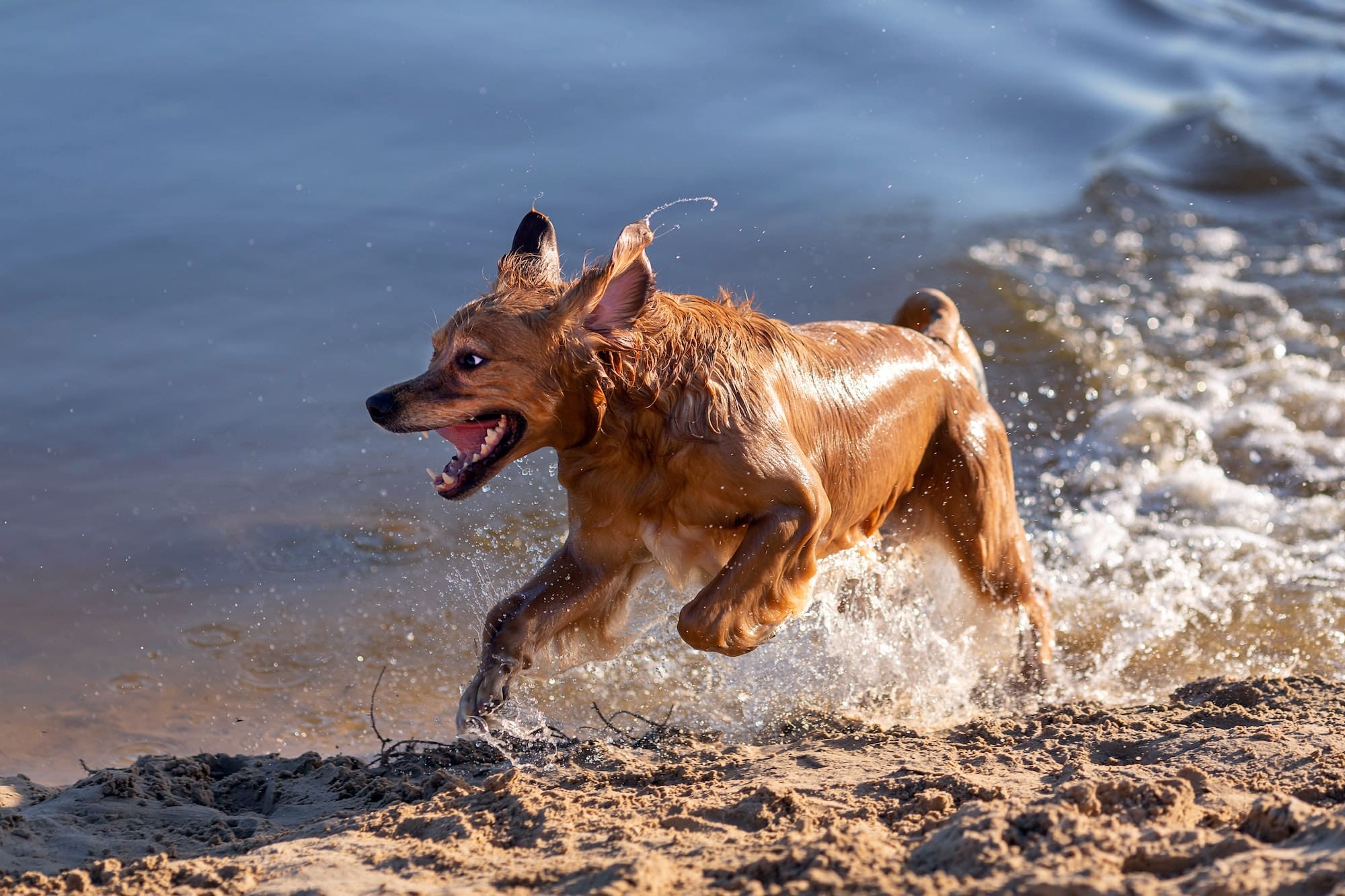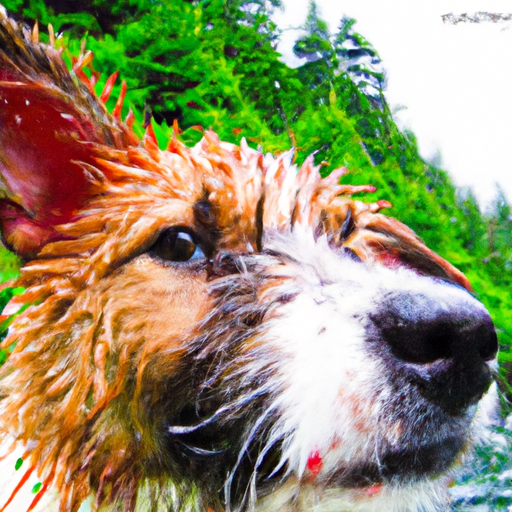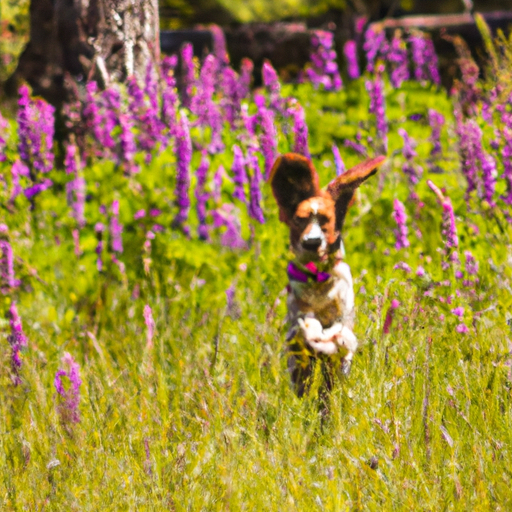Are you struggling to keep up with your puppy's seemingly boundless energy? Dealing with a puppy that has an abundance of energy can be both exhausting and overwhelming. You might find yourself wondering how to handle their increased energy levels without losing your sanity. Fortunately, there are several strategies and techniques that can help you channel your puppy's energy into positive outlets and ensure a happy and healthy relationship between you and your furry friend.
Understanding Increased Energy Levels in Puppies
Puppies are known for their boundless energy and enthusiasm, but sometimes it can feel like your furry friend has an endless supply of energy. Understanding the signs, causes, and impact of increased energy levels in puppies can help you better handle and manage their vivaciousness.
Signs of Increased Energy in Puppies
If you're wondering whether your puppy has increased energy levels, there are several signs to look out for. Puppies with high energy levels often exhibit behaviors such as excessive running, jumping, and playfulness. They may also have difficulty settling down or seem hyperactive even after receiving regular exercise. Additionally, puppies with heightened energy levels may display increased vocalization, restlessness, and a constant need for mental and physical stimulation.
Causes of Increased Energy
Several factors contribute to a puppy's increased energy levels. One of the primary reasons is their age. Puppies are naturally energetic and have a surplus of energy as they go through their developmental stages. Other factors that can contribute to increased energy include breed characteristics and individual personality traits. Some breeds are naturally more active and require more exercise and mental stimulation to burn off excess energy. Additionally, puppies with a higher drive to play and explore may also exhibit increased energy levels.
Impact on their Behavior and Health
While having a lively puppy can be delightful, it's essential to manage their energy levels effectively. When a puppy's energy is not channeled appropriately, it can lead to behavioral problems such as destructive chewing, excessive barking, and jumping on people. Moreover, untreated high energy levels can negatively impact their physical health, potentially causing weight gain, joint issues, and even anxiety or hyperactivity disorders. Therefore, it's crucial to find ways to provide sufficient physical exercise and mental stimulation to help balance their energy levels.
Providing Sufficient Physical Exercise
Physical exercise is vital for puppies to burn off excess energy and maintain a healthy lifestyle. Regular exercise not only helps keep them fit but also promotes mental well-being and prevents behavioral issues. Let's take a closer look at the importance of physical exercise for puppies, different types of exercise, creating a daily exercise routine, and choosing appropriate activities.
Importance of Physical Exercise for Puppies
Physical exercise is essential for puppies as it helps build and strengthen their muscles and bones. Regular exercise also aids in maintaining a healthy weight, reducing the risk of obesity and related health problems. Additionally, physical activity helps puppies release pent-up energy, resulting in better behavior and improved focus during training sessions. Exercise also plays a crucial role in promoting healthy social interactions and reducing stress and anxiety in puppies.
Types of Physical Exercise
When it comes to physical exercise for puppies, it's essential to provide a variety of activities to keep them engaged and stimulated. Some popular types of physical exercise include brisk walks, jogging, running, and playing fetch. Outdoor activities such as hiking, swimming, and agility training can also be excellent options for high-energy puppies. Additionally, interactive toys, such as flirt poles and rope toys, can provide mental and physical stimulation during playtime.
Creating a Daily Exercise Routine
Establishing a daily exercise routine is key to managing your puppy's increased energy levels effectively. It's essential to provide consistent exercise at appropriate intervals throughout the day. A good rule of thumb is to aim for at least 30 minutes to an hour of physical activity spread out over multiple sessions. Breaking up exercise sessions helps prevent overexertion and allows for periods of rest and relaxation.
Choosing Appropriate Exercise Activities
When choosing exercise activities for your puppy, it's crucial to consider their age, breed, and individual capabilities. Puppies have different exercise needs at various stages of their development. For example, younger puppies may require shorter bursts of play and gentle exercise to avoid straining their growing bodies. As they grow, you can gradually increase the intensity and duration of exercise sessions. It's also important to choose activities that match your puppy's energy level and personality. Some puppies thrive on high-intensity activities, while others may prefer more low-impact exercises or mental stimulation through games and training.
Mental Stimulation and Enrichment
Physical exercise alone may not be sufficient to keep your puppy's energy levels in check. Mental stimulation and enrichment activities play a crucial role in providing a well-rounded approach to managing high energy. Let's explore the role of mental stimulation, brain games and puzzle toys, training sessions and commands, and incorporating environmental enrichment.
The Role of Mental Stimulation
Mental stimulation is just as important as physical exercise when it comes to managing increased energy levels in puppies. Engaging your puppy's brain with challenging activities not only tires them out mentally but also provides an outlet for their curiosity and intelligence. Mental stimulation can help prevent boredom and destructive behaviors, leaving your puppy more content and well-behaved.
Brain Games and Puzzle Toys
One effective way to provide mental stimulation is through brain games and puzzle toys. These types of activities require your puppy to think, problem-solve, and use their senses to find hidden treats or solve puzzles. Interactive toys, such as treat-dispensing balls and puzzle feeders, can keep your puppy engaged and mentally stimulated. You can also create DIY brain games using household items, such as hiding treats under cups or teaching them to find hidden toys.
Training Sessions and Commands
Training sessions are not just about teaching your puppy basic obedience commands but also serve as an excellent source of mental stimulation. Teaching your puppy new tricks and commands challenges their cognitive abilities and helps focus their energy on learning and problem-solving. Regular training sessions can be short but frequent, allowing your puppy to concentrate and retain information better. Positive reinforcement training methods, such as using treats and praise, are effective in keeping the sessions fun and rewarding for your puppy.
Incorporating Environmental Enrichment
In addition to brain games and training, environmental enrichment is essential for providing mental stimulation. Giving your puppy opportunities to explore their environment, interact with various textures and objects, and engage their senses can prevent restlessness and boredom. Introduce your puppy to different environments, smells, and sounds to keep their minds engaged. You can also set up interactive play areas at home with tunnels, obstacle courses, and sensory toys to make their living space more mentally stimulating.
Implementing a Structured Routine
To effectively manage your puppy's energy levels, implementing a structured routine is key. A structured routine provides your puppy with a sense of predictability and stability, helping them feel secure. Additionally, a routine allows you to incorporate exercise, mental stimulation, training, and rest in a balanced manner. Here's a closer look at the benefits of a structured routine, establishing a daily schedule, consistency and reinforcement, and adapting the routine as the puppy develops.
Benefits of a Structured Routine
A structured routine benefits both you and your puppy. It helps establish clear expectations, making it easier for your puppy to understand what is expected of them. A routine also ensures that your puppy receives adequate exercise, mental stimulation, and rest, reducing the likelihood of behavioral issues arising from excess energy. Furthermore, a routine provides stability and helps develop good habits, assisting in the overall training process.
Establishing a Daily Schedule
Creating a daily schedule for your puppy helps establish a consistent routine. Start by setting specific times for meals, exercise, training, play, and rest. Puppies thrive on routine, so try to stick to the schedule as closely as possible. Consistency in mealtimes, exercise sessions, and training helps your puppy understand and anticipate their daily activities, reducing stress and anxiety. While it's essential to have a structured routine, remember to allow for flexibility and adaptability as your puppy's needs may change as they grow.
Consistency and Reinforcement
Consistency is key when implementing a structured routine for your puppy. By consistently adhering to the established schedule, your puppy will learn what is expected of them and when. Consistency also applies to your training methods and house rules. Reinforce positive behaviors consistently, reward your puppy for good behavior, and redirect unwanted behaviors consistently. This helps your puppy understand which actions are desirable and ensures that they receive clear and reliable feedback.
Adapting the Routine as the Puppy Develops
As your puppy grows, their exercise and mental stimulation needs will change. It's important to regularly assess and adapt your routine to meet their evolving requirements. Younger puppies may need shorter but more frequent exercise sessions, while older puppies may benefit from more extended periods of physical activity. Similarly, you can gradually increase the difficulty of training exercises and introduce more challenging brain games to keep their minds engaged. Pay attention to your puppy's behavior and energy levels to gauge whether adjustments to the routine are necessary.
Setting Boundaries and Training
Setting clear boundaries and providing proper training are essential components of managing a puppy's increased energy levels. Establishing boundaries helps shape your puppy's behavior and ensures they understand what is acceptable and what is not. Let's explore the importance of boundaries, positive reinforcement training, teaching basic commands, and addressing unwanted behavior.
The Importance of Boundaries
Setting boundaries for your puppy helps establish rules and guidelines for appropriate behavior. As puppies explore and learn about their environment, it's essential to teach them what is off-limits. Boundaries can include areas of the house that are restricted or rules regarding jumping on furniture or people. Consistency in enforcing boundaries helps your puppy understand what is expected of them and promotes good behavior in various contexts.
Positive Reinforcement Training
Positive reinforcement training is a highly effective method for managing your puppy's energy levels and teaching them appropriate behavior. This training technique focuses on rewarding desired behaviors with treats, praise, and play, reinforcing positive actions and encouraging your puppy to repeat them. Positive reinforcement builds a strong bond between you and your puppy, making the training process enjoyable for both of you. It also helps redirect your puppy's excess energy towards appropriate activities and behaviors.
Teaching Basic Commands
Teaching your puppy basic commands is not only beneficial for obedience but also helps channel their energy in a productive manner. Commands such as “sit,” “stay,” and “down” provide mental stimulation and help establish boundaries and control. Start with simple commands and gradually progress to more complex ones as your puppy becomes proficient. Consistency, repetition, and positive reinforcement are key when teaching basic commands.
Addressing Unwanted Behavior
Puppies with increased energy levels may exhibit unwanted behaviors such as jumping, biting, or chewing on objects. It's important to address these behaviors promptly and appropriately. Redirect your puppy's attention to a more acceptable activity when they engage in unwanted behavior. For example, if your puppy starts biting, offer them a chew toy instead. Consistency in redirecting and reinforcing positive behavior will help your puppy understand what is expected of them and encourage good habits.
Healthy Diet and Nutrition
Proper nutrition plays a vital role in managing a puppy's energy levels and overall well-being. Providing a balanced and nutritious diet ensures that your puppy is getting the necessary nutrients to support their growth and development. Let's delve into choosing the right puppy food, scheduled meal times, appropriate treats and chews, and consulting with a veterinarian.
Choosing the Right Puppy Food
Selecting the right puppy food is essential for meeting your puppy's energy requirements and promoting optimal health. Look for high-quality puppy foods specifically formulated for their age and breed size. These foods are designed to provide the right balance of nutrients, including protein, carbohydrates, and fats. Avoid foods with excessive fillers or artificial additives and consult with your veterinarian for personalized advice on selecting the best food for your puppy.
Scheduled Meal Times
Establishing scheduled meal times helps regulate your puppy's energy levels and prevent overeating or undereating. Puppies typically require multiple small meals throughout the day to support their rapid growth and metabolism. Follow the feeding guidelines provided by the food manufacturer or consult with your veterinarian to determine the appropriate portion sizes and feeding frequency for your puppy's age and breed. Providing meals at consistent times helps establish a routine and promotes healthy digestion.
Appropriate Treats and Chews
Treats and chews are an important part of your puppy's diet and can be used to reinforce positive behavior during training or as occasional rewards. However, it's crucial to choose treats and chews that are appropriate for your puppy's age, size, and nutritional needs. Opt for healthy, natural treats made from quality ingredients and avoid those that contain excessive salt, sugar, or harmful additives. Also, ensure that chews are the right size for your puppy to prevent choking hazards. Overfeeding treats or providing inappropriate chews can contribute to excess energy and potential health issues.
Consulting with a Veterinarian
When it comes to your puppy's diet and nutrition, it's always beneficial to consult with a veterinarian. They can provide personalized advice based on your puppy's specific needs, including breed, age, and any underlying health conditions. A veterinarian can help you select the appropriate food, provide guidance on portion sizes, and address any concerns or questions you may have regarding your puppy's diet. Regular check-ups with your veterinarian also ensure that your puppy remains healthy and that any dietary adjustments can be made as needed.
Managing Excitement and Playtime
While it's important to provide sufficient exercise and mental stimulation, managing your puppy's excitement levels during playtime is equally crucial. Teaching your puppy to balance excitement with calmness helps prevent overstimulation and ensures a healthy balance between rest and play. Let's explore creating calm environments, teaching relaxation techniques, structured play sessions, and balancing rest and play.
Creating Calm Environments
Creating a calm environment for your puppy is essential, especially during playtime. Provide a designated play area that is free from distractions and potential hazards. Clear the space of any valuable or fragile items that your puppy may knock over when excited. Minimize noise and sudden movements that can overstimulate your puppy and make it challenging for them to calm down. A calm environment sets the stage for structured play sessions and helps your puppy focus their energy appropriately.
Teaching Relaxation Techniques
Teaching your puppy relaxation techniques can help them learn to calm themselves in stimulating situations. Practice gentle touch and massage techniques that promote relaxation and help your puppy develop self-soothing skills. Gradually introduce calming activities such as nose work or puzzle toys that engage their mind and promote a sense of calmness. By teaching your puppy to relax, you can help them better manage their energy and reduce overexcitement during playtime.
Structured Play Sessions
Having structured play sessions helps your puppy learn appropriate play behavior and provides an outlet for their energy. Start by setting clear rules for play, such as no biting or jumping. Use toys specifically designated for playtime and avoid using your hands or feet as play objects. Break play sessions into shorter, focused periods to prevent overstimulation. During play, incorporate training commands to reinforce good behavior and provide mental stimulation. Structured play sessions help your puppy burn off energy in a controlled and positive manner.
Balancing Rest and Play
Finding the right balance between rest and play is crucial for managing your puppy's energy levels. Puppies need plenty of sleep and rest to support their growth and development. Ensure that your puppy has a comfortable and quiet area designated for rest. Encourage them to take regular nap breaks throughout the day to prevent overexertion. While it may be tempting to engage in non-stop play, it's important to provide your puppy with adequate rest periods to avoid exhaustion and potential health issues related to lack of sleep.
Socialization and Interactions
Socialization is a critical aspect of managing a puppy's energy levels and promoting their overall well-being. Proper socialization ensures that your puppy becomes well-adjusted and comfortable in various environments and situations. Let's explore the importance of socializing puppies, positive interactions with other dogs, meeting new people and environments, and puppy classes and training.
Importance of Socializing Puppies
Socializing puppies from a young age is vital for their development and behavior. Early socialization helps puppies develop positive associations with people, animals, and new environments, reducing the likelihood of fear or aggression later in life. It enables them to learn appropriate social skills, such as how to interact with other dogs and humans, and helps build their confidence. Socialization also provides mental stimulation and channels their energy into positive, socially acceptable behaviors.
Positive Interactions with Other Dogs
Allowing your puppy to interact with other dogs in a controlled and positive manner is an essential part of their socialization process. Organize playdates or set up puppy socialization classes where your puppy can safely interact with other dogs. Encourage gentle and appropriate play behaviors, reward positive interactions, and closely supervise the play sessions. Positive experiences with other dogs not only provide physical exercise but also promote social skills and help manage your puppy's energy levels.
Meeting New People and Environments
Introducing your puppy to a variety of people and environments helps them become well-adjusted and confident in different situations. Take your puppy to different locations, such as parks, busy streets, or pet-friendly stores, to expose them to various sights, sounds, smells, and people. Gradually increase the level of exposure as their confidence grows. Encourage positive interactions with new people by offering treats and praise, ensuring that your puppy associates meeting new individuals with enjoyable experiences. Exposure to different environments and people provides mental stimulation and helps your puppy manage their energy in unfamiliar situations.
Puppy Classes and Training
Enrolling your puppy in puppy classes and training programs offers several benefits in terms of socialization and energy management. Puppy classes provide a controlled environment where your puppy can interact with other dogs and learn important obedience skills. They also help burn off excess energy while providing mental stimulation through training exercises. Certified trainers can guide you in establishing appropriate boundaries and managing your puppy's energy levels effectively. Puppy classes not only contribute to a well-rounded socialization experience but also help build a strong bond between you and your furry friend.
Seeking Professional Help
In some cases, despite your best efforts, your puppy's energy levels may still seem excessive or difficult to manage. Seeking professional help can provide valuable guidance and support in addressing and managing your puppy's energy levels effectively. Let's explore recognizing excessive energy levels, consulting with a veterinarian or animal behaviorist, identifying underlying health issues, and behavioral training programs.
Recognizing Excessive Energy Levels
It's essential to recognize when your puppy's energy levels may be excessive and potentially problematic. While puppies are naturally energetic, persistent or extreme hyperactivity may indicate underlying issues. If your puppy is excessively restless, displays destructive behaviors, or cannot settle down even after proper exercise and mental stimulation, it may be a sign of excessive energy levels that require attention.
Consulting with a Veterinarian or Animal Behaviorist
If you're concerned about your puppy's energy levels or are struggling to manage their behaviors effectively, consulting with a veterinarian or animal behaviorist is highly recommended. A veterinarian can help rule out any underlying health issues that may be contributing to your puppy's energy levels. They can also provide advice on diet, exercise, and general care to ensure your puppy's well-being. An animal behaviorist specializes in addressing behavioral issues and can help develop a personalized training program tailored to your puppy's needs.
Identifying Underlying Health Issues
Excessive energy levels in puppies can sometimes be a sign of underlying health problems. Conditions such as thyroid disorders, allergies, or gastrointestinal issues can affect a puppy's energy levels and behavior. If your puppy's energy levels seem unusually high or their behavior is uncontrollable despite your efforts, it's crucial to have them examined by a veterinarian. A thorough veterinary examination can help identify and address any underlying health issues that may be contributing to their increased energy levels.
Behavioral Training Programs
For puppies with persistent high energy levels and challenging behaviors, behavioral training programs can be beneficial. These programs are typically led by professional dog trainers or behaviorists who specialize in addressing problematic behaviors. A behavioral training program can provide guidance on managing your puppy's energy levels, establishing boundaries, and addressing specific behavioral issues. These programs often incorporate positive reinforcement training techniques and strategies tailored to your puppy's individual needs. Seeking professional help can provide you with the tools and knowledge necessary to manage your puppy's energy levels effectively and ensure their well-being.
Addressing Separation Anxiety
Separation anxiety is a common issue that can contribute to increased energy levels in puppies. If your puppy becomes excessively anxious or restless when left alone, it's important to address this issue to prevent further behavioral problems. Let's discuss understanding separation anxiety, gradual desensitization techniques, creating a safe and comfortable space, and seeking assistance for severe cases.
Understanding Separation Anxiety
Separation anxiety occurs when puppies become overly distressed or anxious when separated from their owners. This anxiety can manifest as excessive barking, destructive behavior, or even self-harm. Separation anxiety is a significant contributor to increased energy levels and can be emotionally taxing for both the puppy and the owner. Understanding the signs and causes of separation anxiety is essential for effectively managing your puppy's energy levels and ensuring their well-being.
Gradual Desensitization Techniques
Treating separation anxiety often requires a gradual desensitization approach. This technique involves gradually exposing your puppy to longer periods of alone time in a controlled and positive manner. Start with short intervals of separation and gradually increase the duration over time. Pair the alone time with positive experiences, such as providing a puzzle toy or a treat-filled toy, to create positive associations with being alone. Consistency and patience are key when implementing desensitization techniques, and seeking professional guidance can be beneficial for severe cases.
Creating a Safe and Comfortable Space
Creating a safe and comfortable space for your puppy when left alone can help alleviate separation anxiety and manage their energy levels. Provide your puppy with a designated area, such as a crate or a specific room, where they feel secure and can relax. Make sure the space has comfortable bedding, toys, and access to water. Consider using pheromone diffusers or calming music to create a soothing environment. Gradually increase the time spent in the designated space to help your puppy become accustomed to being alone and reduce their anxiety levels.
Seeking Assistance for Severe Cases
In severe cases of separation anxiety, professional help may be necessary. A veterinarian or behaviorist can provide guidance on managing separation anxiety and develop a tailored behavior modification plan for your puppy. Medication may also be considered as a last resort in severe cases to help reduce anxiety levels. Remember that separation anxiety is a complex issue, and patience and consistency are required to help your puppy overcome this challenge.
In conclusion, understanding and managing your puppy's increased energy levels is crucial for their overall well-being and behavior. By providing sufficient physical exercise, mental stimulation, a structured routine, training, a healthy diet, managing excitement, and properly socializing your puppy, you can help them develop into well-rounded, balanced, and happy companions. If you encounter difficulties or have concerns, seeking professional help is always an excellent option to ensure the best possible care for your energetic and vibrant furry friend.






